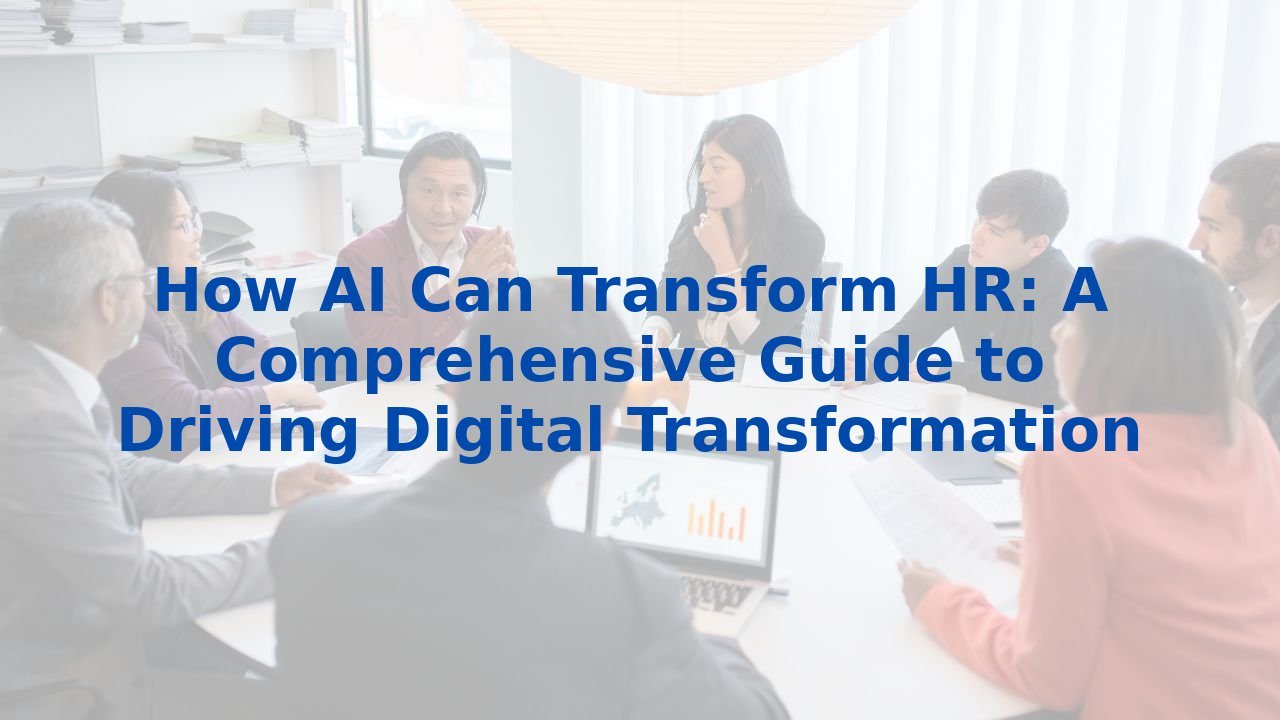How AI Can Transform HR: A Comprehensive Guide to Driving Digital Transformation
The Future of HR: How AI Can Enhance Efficiency and Drive Digital Transformation
Introduction
Imagine a landscape where Human Resources (HR) is not mired in monotonous tasks but rather empowered by cutting-edge technology. The integration of Artificial Intelligence (AI) is set to revolutionize HR processes, making them not only more efficient but also more strategic. However, to truly harness the transformative power of AI, organizations need to embark on a journey of digital transformation. This post explores how AI can redefine HR functions, the tangible benefits it brings, and why that digital shift is essential.
Current State of AI in HR
As AI continues to permeate various sectors, HR is emerging as a pivotal domain for its application. From performance evaluations to talent management and recruitment, AI is making significant strides. For example, HR departments can leverage AI to sift through immense volumes of employee data and generate actionable insights. Yet, the success of these AI interventions is contingent on the richness of the data on hand. Without digitized HR processes, the data remains siloed and often underutilized, thus stifling the capacity for AI to provide critical insights.
Benefits of AI in HR
1. Efficiency and Automation
AI can be a game-changer for organizations by automating repetitive tasks such as data entry, payroll, and benefits administration. This automation liberates HR professionals, enabling them to channel their expertise into strategic initiatives. The speed and accuracy of AI systems also minimize human error, leading to a more efficient workflow.
2. Enhanced Decision-Making
With AI's ability to analyze complex data sets, HR professionals can access rich insights that lead to improved decision-making. From understanding employee development needs to forecasting talent shortages, AI equips HR managers with the foresight to craft effective strategies. Identifying trends remains crucial to proactively mitigate potential issues and ensuring an agile HR function.
3. Improved Employee Experience
In a world where employee satisfaction is paramount, AI tools like chatbots and virtual assistants provide 24/7 assistance. They address common queries and help employees navigate routine tasks, enhancing overall job satisfaction. Furthermore, personalized recommendations based on employee data can foster a more engaging and fulfilling workplace experience.
4. Talent Acquisition and Management
AI is redefining recruitment through data-driven insights. By leveraging AI-driven tools, organizations can streamline their hiring processes—from resume screening to conducting initial interviews. The use of predictive analytics helps identify high performers, allowing for tailored development plans that align with individual employee aspirations while driving organizational goals.
The Importance of Digital Transformation
Despite its vast potential, AI's success hinges on a robust and holistic digital transformation process in HR.
1. Data Standardization
At the core, organizations must ensure their HR data is standardized and digitized. This facilitates easy access and accurate analysis. A cohesive framework that maintains data integrity and security is essential to foster trust in AI-driven insights.
2. Process Optimization
Streamlining HR processes takes precedence to eliminate inefficiencies and bottlenecks. By automating as many mundane tasks as possible, HR staff can focus on what truly matters: people. They can allocate time and resources to foster a culture of growth and inclusivity.
3. System Integration
A successful digital transformation requires the integration of various HR systems into a unified ecosystem. Seamless communication between departments cultivates a harmonious HR management approach, which enhances collaboration and accelerates decision-making.
4. Employee Training
The pivotal role of employee training cannot be overstated. Equipping your teams with the requisite skills to navigate AI tools will maximize their effectiveness. Training also extends to data privacy and security, creating a culture where protecting sensitive information becomes second nature.
Conclusion
The introduction of AI into HR signifies a significant leap toward efficiency and a more strategic approach to managing talent. Yet, to unlock its full potential, organizations must commit to a comprehensive digital transformation. By focusing on data standardization, process optimization, system integration, and employee training, businesses can unleash the myriad benefits of AI, crafting a more effective and employee-centric HR function. In this evolving landscape, the question remains: Are you ready to embrace this transformation?



